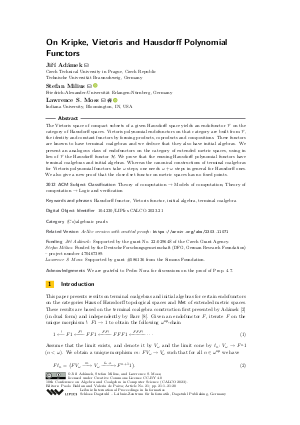On Kripke, Vietoris and Hausdorff Polynomial Functors ((Co)algebraic pearls)
Authors
Jiří Adámek,
Stefan Milius  ,
Lawrence S. Moss
,
Lawrence S. Moss 
-
Part of:
Volume:
10th Conference on Algebra and Coalgebra in Computer Science (CALCO 2023)
Part of: Series: Leibniz International Proceedings in Informatics (LIPIcs)
Part of: Conference: Conference on Algebra and Coalgebra in Computer Science (CALCO) - License:
 Creative Commons Attribution 4.0 International license
Creative Commons Attribution 4.0 International license
- Publication Date: 2023-09-02
File

PDF
LIPIcs.CALCO.2023.21.pdf
- Filesize: 0.77 MB
- 20 pages
Document Identifiers
Related Versions
- ArXiv version with omitted proofs https://arxiv.org/abs/2303.11071
Subject Classification
ACM Subject Classification
- Theory of computation → Models of computation
- Theory of computation → Logic and verification
Keywords
- Hausdorff functor
- Vietoris functor
- initial algebra
- terminal coalgebra
Metrics
- Access Statistics
-
Total Accesses (updated on a weekly basis)
0Document
0Metadata
Abstract
The Vietoris space of compact subsets of a given Hausdorff space yields an endofunctor V on the category of Hausdorff spaces. Vietoris polynomial endofunctors on that category are built from V, the identity and constant functors by forming products, coproducts and compositions. These functors are known to have terminal coalgebras and we deduce that they also have initial algebras. We present an analogous class of endofunctors on the category of extended metric spaces, using in lieu of V the Hausdorff functor ℋ. We prove that the ensuing Hausdorff polynomial functors have terminal coalgebras and initial algebras. Whereas the canonical constructions of terminal coalgebras for Vietoris polynomial functors takes ω steps, one needs ω + ω steps in general for Hausdorff ones. We also give a new proof that the closed set functor on metric spaces has no fixed points.
Cite As Get BibTex
Jiří Adámek, Stefan Milius, and Lawrence S. Moss. On Kripke, Vietoris and Hausdorff Polynomial Functors ((Co)algebraic pearls). In 10th Conference on Algebra and Coalgebra in Computer Science (CALCO 2023). Leibniz International Proceedings in Informatics (LIPIcs), Volume 270, pp. 21:1-21:20, Schloss Dagstuhl – Leibniz-Zentrum für Informatik (2023)
https://doi.org/10.4230/LIPIcs.CALCO.2023.21
BibTex
@InProceedings{adamek_et_al:LIPIcs.CALCO.2023.21,
author = {Ad\'{a}mek, Ji\v{r}{\'\i} and Milius, Stefan and Moss, Lawrence S.},
title = {{On Kripke, Vietoris and Hausdorff Polynomial Functors}},
booktitle = {10th Conference on Algebra and Coalgebra in Computer Science (CALCO 2023)},
pages = {21:1--21:20},
series = {Leibniz International Proceedings in Informatics (LIPIcs)},
ISBN = {978-3-95977-287-7},
ISSN = {1868-8969},
year = {2023},
volume = {270},
editor = {Baldan, Paolo and de Paiva, Valeria},
publisher = {Schloss Dagstuhl -- Leibniz-Zentrum f{\"u}r Informatik},
address = {Dagstuhl, Germany},
URL = {https://drops.dagstuhl.de/entities/document/10.4230/LIPIcs.CALCO.2023.21},
URN = {urn:nbn:de:0030-drops-188189},
doi = {10.4230/LIPIcs.CALCO.2023.21},
annote = {Keywords: Hausdorff functor, Vietoris functor, initial algebra, terminal coalgebra}
}
Author Details
- Czech Technical University in Prague, Czech Republic
- Technische Universität Braunschweig, Germany
Funding
- Adámek, Jiří: Supported by the grant No. 22-02964S of the Czech Grant Agency.
- Milius, Stefan: Funded by the Deutsche Forschungsgemeinschaft (DFG, German Research Foundation) - project number 470467389.
- Moss, Lawrence S.: Supported by grant #586136 from the Simons Foundation.
Acknowledgements
We are grateful to Pedro Nora for discussions on the proof of Prop. 4.7.
References
-
Samson Abramsky. A Cook’s Tour of the finitary non-well-founded sets. In We Will Show Them: Essays in honour of Dov Gabbay, volume 1, pages 1-18. College Publications, 2005.

-
Jiří Adámek. Free algebras and automata realizations in the language of categories. Comment. Math. Univ. Carolin., 15:589-602, 1974.

- Jiří Adámek, Miroslav Hušek, Jiří Rosický, and Walter Tholen. Smallness in topology. preprint; available at https://arxiv.org/abs/2302.00050, accepted for publication in Questiones Mathematicae, 2023.
-
Jiří Adámek, Stefan Milius, and Lawrence S. Moss. Initial algebras without iteration. In Fabio Gaducci and Alexandra Silva, editors, 9th Conference on Algebra and Coalgebra in Computer Science (CALCO), volume 211 of LIPIcs, pages 5:1-5:20. Schloss Dagstuhl, 2021.

-
Jiří Adámek, Stefan Milius, Lawrence S. Moss, and Henning Urbat. On finitary functors and their presentations. J. Comput. System Sci., 81(5):813-833, 2015.

-
Jiří Adámek and Jiří Rosický. Approximate injectivity and smallness in metric-enriched categories. J. Pure Appl. Algebra, 226(6), 2022. Article 106974.

-
Michael F. Barnsley. Fractals Everywhere. Morgan Kaufmann, 2nd edition, 1993.

-
Michael Barr. Terminal coalgebras in well-founded set theory. Theoret. Comput. Sci., 114(2):299-315, 1993.

-
Samuel Eilenberg and Norman Steenrod. Foundations of Algebraic Topology. Princeton University Press, 1952.

-
Felix Hausdorff. Grundzüge der Mengenlehre. Veit & Comp., Leipzig, 1914.

-
Dirk Hofmann, Renato Neves, and Pedro Nora. Limits in categories of Vietoris coalgebras. Math. Structures Comput. Sci., 29(4):552-587, 2019.

-
Bart Jacobs. Introduction to Coalgebra. Towards Mathematics of States and Observation. Cambridge University Press, 2016.

-
Peter Johnstone. Stone Spaces. Cambridge Univ. Press, 1986.

-
Clemens Kupke, Alexander Kurz, and Yde Venema. Stone coalgebras. Theoret. Comput. Sci., 327(1-2):109-132, 2004.

-
Michael Makkai and Robert Paré. Accessible Categories: the Foundation of Categorical Model Theory, volume 104 of Contemporary Math. Amer. Math. Soc., Providence, RI, 1989.

-
Ernest Michael. Topologies on spaces of subsets. Trans. Amer. Math. Soc., 71:152-182, 1951.

-
Dimitrie Pompeiu. Sur la continuité des fonctions de variables complexes. Annales de la Faculté des Sciences de la Université de Toulouse pour les Sciences Mathématiques et les Sciences Physiques, 2ième Série, 7(3):265-315, 1905.

-
Luis Ribes and Pavel Zalesskii. Profinite Groups, volume 40 of Ergebnisse der Mathematik und ihrer Grenzgebiete. Springer, 2nd edition, 2010.

-
Martin Rößiger. Coalgebras and modal logic. In Horst Reichel, editor, Proc. Coalgebraic Methods in Computer Science (CMCS 2000), volume 33 of Electron. Notes Theor. Comput. Sci., pages 294-315. Elsevier, 2000.

-
Franck van Breugel. De Bakker-Zucker processes revisited. Inform. and Comput., 188(1):68-76, 2004.

-
Franck van Breugel, Camillo Costantini, and Stephen Watson. Isometries between a metric space and its hyperspace, function space, and space of measures. Topology Appl., 137(1-3):51-57, 2004.

-
Leopold Vietoris. Bereiche zweiter Ordnung. Monatsh. Math. Phys., 32(1):258-280, 1922.

-
James Worrell. On the final sequence of a finitary set functor. Theoret. Comput. Sci., 338:184-199, 2005.

-
Phillip Zenor. On the completeness of the space of compact subsets. Proc. Amer. Math. Soc., 26(1):190-192, 1970.

